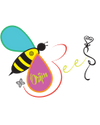
|The Birth of a Bee|
From the moment we discovered we were to become parents, my husband Archyn (the founder of Orijin Culture) and I started to plan our daughter’s future. How did we want to raise her? We knew right away that we wanted her to experience all the diverse cultures that the world has to offer. She would become a global citizen while never forgetting her deep-rooted African culture. It’s the cultures – Cape Verde and Ghana -that both my husband and I were raised in. We’re unapologetically proud of our cultures, and we wanted to pass that onto our daughter.
| Nurturing and Culturing Two Bees |
Flash forward a few years, and you think everything is okay and going to plan. By now, Esi had a passport full of stamps and had earnt the title of frequent flyer. We had lived between Africa and the US during Esi’s early years while also travelling around the world. She had the most diverse palette of any child I’ve ever met, eating foods from every culture. Esi learnt dances in different countries and could say ‘hello’ in more languages than most adults ever could.
Our daughter Africa was born two years after Esi. As second-time parents, we felt more experienced and were confident that we could show Africa her heritage, the same way we had with Esi. I made them African dresses, filled their room with educational children’s books, and taught them traditional African dances and cooked the food we grew up with.

|Losing Identity to a System|
It was all going so well - until it wasn’t.
The time quickly rolled around for Esi to go to school. Like any parent, we wanted to give her the best education possible and enrolled her in a private school known for their academic excellence. Esi loved school – and the only tears on her first day were from me.
Within a few weeks, it all started to change. I noticed her tastes for TV shows and dolls were changing, switching to Caucasian dolls and actors. This switch wasn’t an intentional one. It had happened without us even realising because of the environment she found herself in at school. We knew Esi was getting a world-renowned education, but at what cost?
|Transparency with the School|
Like any mom, I went straight into panic mode and started looking for a solution.
I spoke to the head of her school, communicated with her teachers of my concerns. Esi’s school was very understanding and supportive with my efforts and concerns. I made an effort to enroll her into extracurricular activities where I knew there would be kids from diverse backgrounds. As a mother, even with all of this, I felt it wasn’t enough.
Everything we had worked on during Esi’s first years of life had disappeared in just a few weeks. The world we had created for her, where she could explore and appreciate her rich African heritage and culture, was vanishing before our very eyes.
|The Beginning of the Orijin Bees|
There comes a time when you have to face reality - when you have to stop compromising and instead face the situation head-on.
While this was happening, I couldn’t stop thinking about the other families in similar situations. What about the children who weren’t being taught about diversity outside of school? I spent a lot of my time venting to my husband. The lightening point of my frustration became the toy aisle while shopping. Esi suddenly went from asking for one of the few ethnic dolls on the shelf to wanting a Caucasian doll.
As my husband always does, he thought of the solution. He suggested I make the dolls I wanted to see in the toy aisles!
That is the story of how the Orijin Bees story began – out of a desire for ethnic dolls that look like us, dress like us, and reflect the world around us.
Dolls that come with different complexions and hair textures, just like our children. Dolls that could play a role in teaching the next generation about diversity and unity. For that to happen, we have to build together a community around a common cause.
I believe that the Most High has put all of us here for a purpose. We touch each other’s lives in different ways. I hope that Orijin Bees adds something positive to our community. A mother’s love is a gift. Mothers come in all forms, but they share the same foundation. Love. A mother’s love extends beyond her children and to the children around her. This love is what we built Orijin Bees with. This love is what will help us grow together. It’s why our GetOne GiftOne program was born – to pass that love on to all children.
The future is bright, and our work has inspired us to grow and develop our mission beyond dolls and other educational toys for children. Our mission won’t be over until every child knows their worth and can hold a toy that looks like them and represents their community. It won’t be over until we teach every child to love themselves and their identity instead of conforming to society's demands.
I hope these toys are seen not as objects but something so much more. They are a way for children to take pride in their heritage, celebrate their identity, and embrace their cultural roots. These toys are a conversation piece to form a discussion around education our children and reunifying our society. These teachings will help develop the next generation into the Kings and Queens that they are destined to be.
